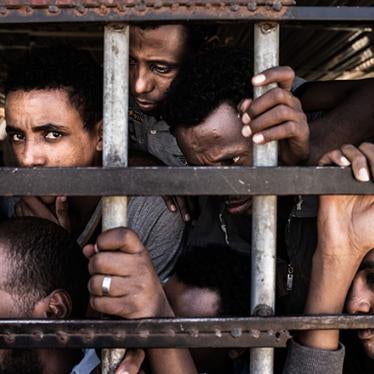Human rights conditions in Libya regressed sharply in 2014, reaching a low point since the end of the uprising that toppled Muammar Gaddafi in 2011, Human Rights Watch said today in its World Report 2015. The outbreak of new armed conflicts, combined with a further collapse of government authority in much of the country, eliminated any semblance of law and order from large parts of Libya.
Beginning in May, clashes between armed militia in eastern Libya escalated into armed conflicts that by July had also engulfed western areas, including Tripoli, the capital. The violence killed hundreds of people, including civilians, displaced hundreds of thousands of people from their homes, and destroyed vital civilian infrastructure, including Tripoli’s main airport and hospitals, causing severe shortages of food and other basic resources. At year’s end, thousands of people remained in arbitrary detention outside of government control, thousands more remained forcibly displaced, and the justice system had ceased functioning in key regions.
“Libya’s opposing political factions show utter disregard for civilian lives as they wage war against each other and commit war crimes and other serious abuses with impunity,” said Sarah Leah Whitson, Middle East and North Africa director. “International entities that supported the Libyan uprising need to press all sides to end the bloodshed and to bring those who commit grave abuses to justice.”
In the 656-page world report, its 25th edition, Human Rights Watch reviews human rights practices in more than 90 countries. In his introductory essay, Executive Director Kenneth Roth urges governments to recognize that human rights offer an effective moral guide in turbulent times, and that violating rights can spark or aggravate serious security challenges. The short-term gains of undermining core values of freedom and non-discrimination are rarely worth the long-term price.
In its Libya review, Human Rights Watch highlighted a rising toll of assassinations by unidentified assailants of activists, journalists, politicians, and members of the armed forces, that likely amount to crimes against humanity. At least 250 such killings occurred between January and September in the eastern cities of Benghazi and Derna alone. An international Commission of Inquiry or similar mechanism is needed to investigate these and other serious crimes and to publish its findings.
Militias engaged in the armed conflicts committed war crimes, including attacks on civilians and civilian infrastructure, looting, burning, and kidnapping. Some militias in Derna announced their affiliation to the extremist group Islamic State (also known as ISIS). The groups terrorized residents and imposed a harsh administration in the areas they control with public executions, lashings, and requirements for public repentance for those they considered to be “infidels.”
Libya’s justice system scarcely functioned, as growing insecurity led courts and prosecutors to suspend activities in Benghazi and other cities. Thousands remained in arbitrary detention outside of state control, even after armed conflicts broke out, and faced torture and other ill-treatment and a failure of due process guarantees.
The International Criminal Court prosecutor, who has jurisdiction over serious crimes committed in Libya since February 15, 2011, has not pursued additional cases into ongoing grave abuses, citing instability in Libya and lack of resources as obstacles to further probes by her office.
The United Nations Security Council adopted resolution 2174, which threatens perpetrators of serious crimes with sanctions, including travel bans and asset freezes, but so far has failed to deliver on the threat.







